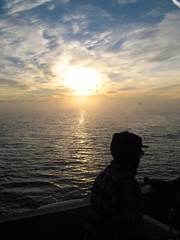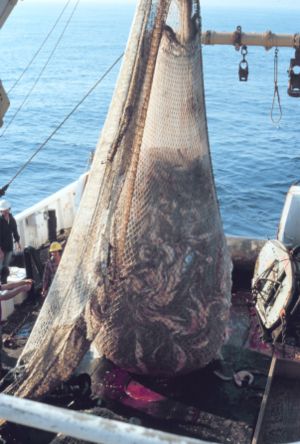 Image by itsbooyer via Flickr
Image by itsbooyer via Flickr
The Christmas Rose was only forty feet in length and could seine net inside the three mile limit, with the only rules to bother about being, "the dhan must never be shot before sunrise or after sundown" and correct mesh sizes, which gave the skipper "Jimmy Napier" plenty scope to utilise the rich fishing grounds inside the line.
Jimmy was one of the characters of the fishing fleet, but a true gentleman also, and when he asked me to fill in for a week on his boat I did not hesitate, as being just newly married with a wife and son to take care of, I knew the money would come in handy.
As I said the Olive Tree was tied up for a week and as we were classed as self-employed, whenever the boats were tied up for repairs or an overhaul we were not paid, so Jimmy's knock on the door turned out to be, not only prosperous but it also gave me a fascinating insight into fishing inside the limit LEGALLY.
As it was Autumn, the signs and aromas of summer were disappearing fast, and with the days shortening, a cold sharp feel was creeping into to the early morning atmosphere, that drew clean fresh sea air into your lungs every time you inhaled. (as long as you were clear of the engine exhaust and the smoke billowing from the chimney, that lead down through the deck to the coal fire in the foc's'le.) "Theres a smell of winter in the air" Jimmy remarked as we sailed north towards Irvine bay, hoping for some good hauls of codling that were sometimes to be found there at this time of year, but as the fishing had been poor lately we would have to wait until the first haul came on board before we could be sure it was going to be worth our while.
Jimmy new the fishing was poor but he had promised me twenty pounds at the end of the week, whether we had caught enough fish to warrant that as a wage or not, such was his gratitude to me for filling in for him being short crewed. (Twenty pounds was a good living wage then)
We seemed to steam in very close to the land when Jimmy shouted to throw the dan away, and as the eight coil of ropes on the first side were being shot we travelled farther inshore, until we turned to shoot the net. "If you jumped over the side just now ma' loon, you widna' be over your head" said Jimmy as I threw the cod end over the side. (LOON is the east coast way of saying son) and as we headed back to our dan I could still see the floats on the headline of our net on top of the water as it wasn't even deep enough to sink all of our net, and it was only when we began towing off into slightly deeper water did the net become fully submerged, but only just.
All this was a new adventure to me, and when the cod end came aboard an hour later there was enough fish in it to keep us there for the rest of the day, giving me new experiences of being able to watch people ashore as they walked their dogs along the beach.
Being forty feet the Christmas Rose had not the capacity to hold big catches of fish or have very good facilities, cooking wise and sleeping wise so it was fortunate that we were never far from home, and we would return to Ayr every night to land our catch and have a wee dram in the Marine bar before going home to a cosy bed.
The next day brought a glorious morning and rather than head north to where we had good fishing, Jimmy decided to head south to Culzean bay and try our luck there.
I had complete faith in Jimmy's judgement, and sure enough when the first haul came aboard, it was a good haul of plaice, sole and a selection of other good quality fish, that landed on the deck when I opened the cod end.
As the day went on into the afternoon the sun became quite warm for the time of year and being so close to the shore we could see folk arriving in their cars at Croy shore to enjoy, what could be one of the last nice days of the year, It was a great experience for me to be able to watch all this going on while I was working, as it was only on rare occasions that we could see the land never mind everything that was going on ashore. The sweat was pouring out of us and all we had to drink was warm water from the freshwater tank in the engine room, hot tea/ coffee from a kettle of water boiled on the coal stove, or the last few dregs in a bottle of lemonade that was placed on top of the mooring rope with the cold sea water from the hose running on it to give us something cool to drink.
Imagine how I felt when an ice-cream van arrived on the beach, and although only about half a mile away from it, I could not hear the music it played, but I could see the queue gathering to get the refreshments of their choice, that I would have dearly paid well over the odds for.
So there was disadvantages to fishing inshore after all I thought as my dry mouth longed to be in the queue that was so near yet so far.
We moved farther south to Turnberry lighthouse where the ice-cream van, and it's goodies were out of sight, but not out of mind.
We were so close to the rocks when I threw the cod end away this time, that I was afraid to throw it too hard in case it landed on the rocks.
That week brought a whole new meaning to fishing inside the limit to me, compared to our efforts on the Olive Tree as each day we ventured to new grounds with the same astounding closeness to rocks or beach, and although the Christmas Rose was only forty feet, with a shallow draft, some of the places Jimmy took us made me wonder just how much clearance there was between our keel and the rocks.
I got through the week without any mishaps of course as Jimmy knew what he was doing, and when he handed me my pay packet on the Friday evening..............in the Marine bar, there was more than the twenty pounds he had promised me, and on handing it over said "there ye' go ma' loon I promised you twenty pounds and there is a bit more, NOW if you would like to stay with me I will guarantee you a wage every week , plus I will cover your rent every week on top of that."
It was a hard offer to refuse, but when I weighed up the comparisons between the Olive Tree and the Christmas Rose, I chose the Olive Tree it being the family boat, also it was hard graft on the Christmas Rose, with it being small and compact, and with a lot less comforts than the Olive Tree, but I never forgot my experience of working inside legally, and came away with even more respect for Jimmy than I had before, and going by his offer I think he held me in the same high esteem.
Jimmy had brought his wife and family (two daughters) from Whitehills on the north east coast of Scotland to settle in Ayr where he thought there was better prospects for his daughters to grow up in, and having fished on the west coast on a regular basis it would save him travelling back and forth every week, hence the poor attempt at me trying to convey his accent in my writing.
He fished with the Christmas Rose until it became outdated, and found it harder to compete alongside the modern vessels that were being built, also with the new rules and regulations coming in from the EU he decided to sell up. He found a job working with one of the fish merchants, weighing the prawns that the fleet were now bringing in, and many a good chinwag I had with him in the Marine bar when I came back from a trip, but his heart was always at sea, as is mine, and of course our stories were all about the "good old days" and having passed away a few years ago, and being the gentleman that he was, makes him well worth a mention, when I am recalling "the good old days."
![Reblog this post [with Zemanta]](http://img.zemanta.com/reblog_e.png?x-id=7c93a1d6-1f66-4c40-8225-9605ea633106)

![Reblog this post [with Zemanta]](http://img.zemanta.com/reblog_e.png?x-id=b6c9dbbd-0676-4384-bbd7-853a2e845a06)

![Reblog this post [with Zemanta]](http://img.zemanta.com/reblog_e.png?x-id=5b0bc47c-2880-4cfb-8e1f-6da43e02b1b3)

![Reblog this post [with Zemanta]](http://img.zemanta.com/reblog_e.png?x-id=245e214c-7c7d-422b-a1b6-7a30e31d82a7)
